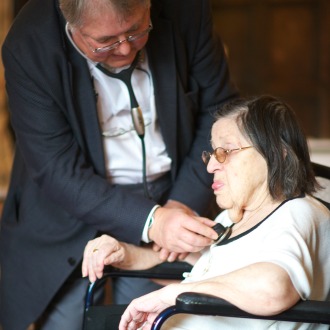GPs told to say ‘no’ to care home antiviral requests until LES is agreed

The GPC is advising GPs not to agree to requests for bulk oseltamivir (Tamiflu) prescriptions in care homes, following concerns about ‘inappropriate pressure’ from public health officials.
In a letter to Public Health England (PHE), the GPC said practices are under no contractual obligation to do the work and if PHE wants practices to do it they should create an enhanced service under which to pay them.
The letter, which comes as some GPs felt bullied by local PHE officials into prescribing care home antivirals at very short notice resulting in one significant untoward incident where a patient was given the wrong dose, said the ‘current workload crisis’ in general practice meant GP practice ‘cannot simply absorb’ this type of work but needed to focus on ‘the safe provision of core services’.
GPC executive member Dr Dean Marshall wrote in the letter, sent last week (4 February): ‘I am writing to you following concerns raised by a number of GPs from across England about inappropriate pressure from PHE to prescribe Tamiflu for the prophylaxis of influenza in nursing and care homes where there have been confirmed cases of influenza.’
He said GMS regulations were clear regarding ‘essential services’, under which this did not fall, adding: ‘Additional work must be commissioned and funded separately as an enhanced service. Examples of these are the influenza vaccination programme and catch-up MMR vaccination campaign.’
Berkshire, Buckinghamshire and Oxfordshire LMC chief executive Dr Paul Roblin also complained to PHE that this was not GPs’ responsibility, but was told GP practices should do the work because ‘it is critical to avoid a situation in which vulnerable patients are disadvantaged by not receiving necessary treatment because of disagreements about contractual issues and responsibilities’.
Dr Roblin told Pulse: ‘When I meet with them, they say “we’re not contracted to do it”. Neither are GPs contracted to – yet they say we should just forget about that, think about patients and sort out the contractual side later. I could apply the same argument to them. They’re the ones that feel patients should have the service – in that case they should put patients first and do it.’
In a statement, Professor Paul Cosford said PHE would continue to talk to the GPC and NHS England about contractual arrangements, but that GPs should in the meantime ensure vulnerable patients are treated appropriately.
Professor Cosford said: ‘It is common practice for general practitioners to prescribe influenza antiviral medications when appropriate to vulnerable adults in the care home setting, in discussion with PHE. There is clearly some debate around contractual requirements for this to continue, and Public Health England is committed to dialogue with NHS England, the British Medical Association and other partners to ensure this is addressed. In the meantime, PHE considers that vulnerable patients should receive appropriate treatment first and that contractual issues should be dealt with separately.’
Pulse October survey
Take our July 2025 survey to potentially win £1.000 worth of tokens

Visit Pulse Reference for details on 140 symptoms, including easily searchable symptoms and categories, offering you a free platform to check symptoms and receive potential diagnoses during consultations.









